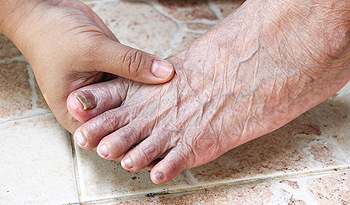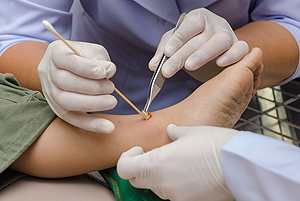February 2022
What Is Ankle Dislocation?
Ankle dislocation occurs when the bones in your ankle joint move out of place, usually due to a sudden injury. Symptoms of a dislocated ankle include pain, swelling, bruising, soreness, and an inability to put weight on the affected ankle. If you suspect that you may have dislocated your ankle, there are things you can do to ease your pain while you wait to see your podiatrist. Rest and elevate the affected ankle to reduce pressure on the injury. Apply ice to reduce swelling. Take over-the-counter pain medications to relieve pain. Compressing the ankle with an elastic bandage may also be helpful. For more information about ankle dislocations, please consult with a podiatrist.
Ankle and foot injuries are common among athletes and in many sports. They can be caused by several problems and may be potentially serious. If you are feeling pain or think you were injured in a sporting event or when exercising, consult with the podiatrists from New England Family Foot Care. Our doctors will assess your condition and provide you with quality foot and ankle treatment.
Common Injuries
The most common injuries that occur in sporting activities include:
- Achilles Tendonitis
- Achilles Tendon Rupture
- Ankle Sprains
- Broken Foot
- Plantar Fasciitis
- Stress Fractures
- Turf Toe
Symptoms
Symptoms vary depending upon the injury and in some cases, there may be no symptoms at all. However, in most cases, some form of symptom is experienced. Pain, aching, burning, bruising, tenderness, tightness or stiffness, sensation loss, difficulty moving, and swelling are the most common symptoms.
Treatment
Just as symptoms vary depending upon the injury, so do treatment options. A common treatment method is known as the RICE method. This method involves rest, applying ice, compression and elevating the afflicted foot or ankle. If the injury appears to be more serious, surgery might be required, such as arthroscopic or reconstructive surgery. Lastly, rehabilitation or therapy might be needed to gain full functionality in the afflicted area. Any discomfort experienced by an athlete must be evaluated by a licensed, reputable medical professional.
If you have any questions, please feel free to contact our office located in Milton, MA . We offer the newest diagnostic and treatment technologies for all your foot care needs.
Managing Sesamoiditis
Sesamoiditis, an inflammation of the two tiny sesamoid bones located just beneath the big toe, can cause foot pain in the ball of the foot. A bone scan or MRI, in addition to a physical examination, are typically needed to diagnose this condition. There are various means for managing sesamoiditis. These include immobilizing and resting the affected foot, wearing orthotics, taking non-steroidal anti-inflammatory medications to reduce pain, applying ice to the area, and going to physical therapy. If these management strategies don’t provide adequate relief, corticosteroid injections directly into the foot may help. If you are suffering from foot pain, it's a good idea to schedule an appointment with a podiatrist near you.
Sesamoiditis is an unpleasant foot condition characterized by pain in the balls of the feet. If you think you’re struggling with sesamoiditis, contact the podiatrists of New England Family Foot Care. Our doctors will treat your condition thoroughly and effectively.
Sesamoiditis
Sesamoiditis is a condition of the foot that affects the ball of the foot. It is more common in younger people than it is in older people. It can also occur with people who have begun a new exercise program, since their bodies are adjusting to the new physical regimen. Pain may also be caused by the inflammation of tendons surrounding the bones. It is important to seek treatment in its early stages because if you ignore the pain, this condition can lead to more serious problems such as severe irritation and bone fractures.
Causes of Sesamoiditis
- Sudden increase in activity
- Increase in physically strenuous movement without a proper warm up or build up
- Foot structure: those who have smaller, bonier feet or those with a high arch may be more susceptible
Treatment for sesamoiditis is non-invasive and simple. Doctors may recommend a strict rest period where the patient forgoes most physical activity. This will help give the patient time to heal their feet through limited activity. For serious cases, it is best to speak with your doctor to determine a treatment option that will help your specific needs.
If you have any questions please feel free to contact our office located in Milton, MA . We offer the newest diagnostic and treatment technologies for all your foot and ankle needs.
It's Time for Beautiful Feet
The Importance of Foot Checkups for Older Adults
 Taking care of your foot health is important at any stage of your life but becomes increasingly important with age. Older adults are more likely to have medical conditions that affect their feet, such as diabetes, poor circulation, neuropathy, or arthritis, and may also be at an increased risk of foot injuries, deformity, weakness, and pain. Poor foot health is often associated with a decrease in quality of life and lower independence in completing activities of daily living. Unfortunately, the feet are sometimes neglected when it comes to regular checkups. If you are an older adult, ignoring your feet could lead to problems. It is suggested that you consult with a podiatrist regularly to monitor your foot health and treat any existing conditions.
Taking care of your foot health is important at any stage of your life but becomes increasingly important with age. Older adults are more likely to have medical conditions that affect their feet, such as diabetes, poor circulation, neuropathy, or arthritis, and may also be at an increased risk of foot injuries, deformity, weakness, and pain. Poor foot health is often associated with a decrease in quality of life and lower independence in completing activities of daily living. Unfortunately, the feet are sometimes neglected when it comes to regular checkups. If you are an older adult, ignoring your feet could lead to problems. It is suggested that you consult with a podiatrist regularly to monitor your foot health and treat any existing conditions.
If you need your feet checked, contact the podiatrists of New England Family Foot Care. Our doctors will attend to all of your foot and ankle needs and provide you with quality treatment.
Geriatrics and Podiatry
When people age, some common issues that may occur are bone density loss, dry skin, poor circulation, and rough brittle nails. These issues may also affect your foot health if the necessary steps are not taken to alleviate the problems.
It is important to take care of your feet because feet that are injured or diseased can affect your overall health. Having painful feet hinders your ability to do daily activities or may decrease your willingness to do the things that you need to do.
Visiting Your Geriatrician
As we age, health problems become more likely, so it is essential to visit your doctor for check-ups to ensure that you are doing the best you can to take care of your health. It is recommended to check your feet frequently for any possible cuts, bruises, swelling, corns or any other irregularities.
Taking Care of Elderly Feet
Cracked or dry feet can be treated by applying moisturizer often. It is also important not to wear old socks because the older the sock is, the higher the possibility there will be that there is bacteria there. Wear fresh socks and make sure they fit properly.
Proper foot health means that you can have a more active lifestyle and you will not be bogged down by pain. Foot health also leads to good circulation, which is paramount for overall health.
If you have any questions, please feel free to contact our office located in Milton, MA . We offer the newest diagnostic tools and technology to treat your foot and ankle needs.
What to Do With a DFU
A DFU, or diabetic foot ulcer, is an unfortunately frequent complication of diabetes. Caused by a combination of high blood glucose levels, poor circulation, nerve damage, and immune insufficiency, DFUs are dangerous wounds that can form on the feet. These wounds typically heal slowly and poorly, and so they often require medical care. It is suggested that you call your podiatrist if you have a DFU and notice any new pain, drainage, discoloration, swelling, foul odor, or dead tissue at the site of the ulcer. You also may wish to seek medical treatment if the DFU increases in size or depth, or if it doesn’t heal. Some treatments that may help at the doctor’s office include debridement to remove dead tissue, medicated bandages, off-loading using orthotics, and surgery. If you have diabetes, it is suggested that you be under the regular care of a podiatrist.
Wound care is an important part in dealing with diabetes. If you have diabetes and a foot wound or would like more information about wound care for diabetics, consult with the podiatrists from New England Family Foot Care. Our doctors will assess your condition and provide you with quality foot and ankle treatment.
What Is Wound Care?
Wound care is the practice of taking proper care of a wound. This can range from the smallest to the largest of wounds. While everyone can benefit from proper wound care, it is much more important for diabetics. Diabetics often suffer from poor blood circulation which causes wounds to heal much slower than they would in a non-diabetic.
What Is the Importance of Wound Care?
While it may not seem apparent with small ulcers on the foot, for diabetics, any size ulcer can become infected. Diabetics often also suffer from neuropathy, or nerve loss. This means they might not even feel when they have an ulcer on their foot. If the wound becomes severely infected, amputation may be necessary. Therefore, it is of the upmost importance to properly care for any and all foot wounds.
How to Care for Wounds
The best way to care for foot wounds is to prevent them. For diabetics, this means daily inspections of the feet for any signs of abnormalities or ulcers. It is also recommended to see a podiatrist several times a year for a foot inspection. If you do have an ulcer, run the wound under water to clear dirt from the wound; then apply antibiotic ointment to the wound and cover with a bandage. Bandages should be changed daily and keeping pressure off the wound is smart. It is advised to see a podiatrist, who can keep an eye on it.
If you have any questions, please feel free to contact our office located in Milton, MA . We offer the newest diagnostic and treatment technologies for all your foot care needs.












